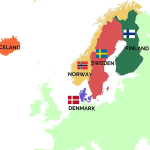Are you an entrepreneur seeking promising chances? If so, Norway is a must-consider. It boasts top-quality education, high productivity, and a strong culture of innovation. These factors make Norway ideal for starting businesses. It excels in areas like oil and gas, energy, maritime, and seafood. Furthermore, fields such as Medtech, FinTech, and Edtech are rapidly growing too. Norway was ranked sixth in the ‘Ease of doing business 2020’ survey. This shows how welcoming it is for companies, new or established.
Key Takeaways:
- Norway offers numerous opportunities for entrepreneurs to set up businesses.
- Industries such as oil and gas, energy, maritime, and seafood are thriving in Norway.
- Sectors like Medtech, FinTech, and Edtech are also growing rapidly.
- Norway ranks sixth in the ‘Ease of doing business 2020’ survey.
- The country provides a favorable environment for both established companies and start-ups.
Advantages of Doing Business in Norway
Norway has a lot to offer businesses wanting to set up there. It stands out with its strong and steady economy. Plus, it has a high standard of living. Being part of the European Economic Area (EEA) makes it attractive for entrepreneurs.
The efficient banking system in Norway is another plus. It makes getting financial services and transacting easy. This means businesses can run without a hitch and focus on getting bigger.
Businesses also enjoy good tax incentives in Norway. These help lower the amount they pay in taxes. The goal is to boost entrepreneurship and investment in the nation. Such benefits pave the way for business growth, innovation, and employee training.
Norway is also seeing more foreign investment lately. This reflects the trust global companies have in its business environment. This trend not only boosts collaboration and networking but also contributes to the economy’s energy and expansion.
Furthermore, Norway’s government is on the side of businesses. It actively backs entrepreneurship and new ideas. This support comes in many forms, like aid for startups and grants for research. Plus, companies can tap into a pool of highly educated workers.
Benefits of doing business in Norway:
- Strong and stable economy
- High standard of living
- Efficient banking system
- Tax incentives
- Rising foreign investments
- Business-friendly environment
- Government support
In sum, Norway offers a great package for business success. Its mix of benefits makes it a top pick for those wanting to grow.
| Advantages | Benefits |
|---|---|
| Strong and stable economy | Provides a solid foundation for business growth and stability |
| High standard of living | Attracts skilled workers and provides a quality lifestyle for employees |
| Efficient banking system | Streamlines financial transactions and provides easy access to funding |
| Tax incentives | Reduces overall tax burden and encourages investment and innovation |
| Rising foreign investments | Brings new opportunities for collaboration and growth |
| Business-friendly environment | Creates a supportive ecosystem for entrepreneurs and companies |
| Government support | Offers financial assistance and resources for business development |
Business Opportunities in Norway
Norway has many great chances for businesses in growing fields. Entrepreneurs can gain from a good business setting and government backing. This makes starting a business here more likely to succeed.
1. Technology Sector
Startups in Norway have a big potential for growth. The government supports them with grants and help to promote new tech. There are plenty of skilled workers and a good atmosphere for new businesses. So, Norway is a top choice for tech companies.
2. Renewable Energy
In Norway, renewable energy is growing fast. The country’s focus on green energy creates openings for new technology and projects. Companies can find many chances in wind, solar, and hydro power here. This makes Norway a key spot for clean energy projects.
3. Healthcare Industry
Norway’s healthcare sector is a good area for business. With a growing number of elderly people, there’s more need for health services. Entrepreneurs can look into making medical devices, telehealth services, and new health technologies.
4. Maritime Sector
Norway’s rich maritime history means there are many business chances in ports, making ships, and moving goods. The shipping and fishing industries are strong here. Thanks to its great location and infrastructure, Norway is perfect for maritime businesses.
| Sector | Business Opportunities |
|---|---|
| Technology | Startups, innovation, software development |
| Renewable Energy | Wind, solar, hydroelectric power |
| Healthcare | Hospitals, home healthcare services, medical devices |
| Maritime | Port operations, shipbuilding, cargo transport |
There are more sectors in Norway worth exploring, like FinTech, EdTech, and MedTech. With the proper research and strategy, starting a business in Norway could be a big success.
Challenges of Doing Business in Norway
Norway has lots to offer for businesses, but it comes with its own set of challenges. These include a high cost of living and strict labour laws. Add in a competitive market, and businesses have their work cut out.
The steep cost of living can squeeze a business’s bottom line. Prices for goods and services are higher. This means companies need to watch their spending and think carefully about how they price their products.
Labor laws in Norway are strict, aiming for fairness for all workers. While that’s a good thing, it adds to the cost and paperwork for businesses. They need to ensure they follow all the rules about working conditions and benefits.
Trying to break into Norway’s market can be tough, especially for foreign companies. With a small, competitive space, it’s hard to make your mark. To succeed, it’s vital to have a strong plan for entering the market, know your market well, and have something special to offer.
| Challenges of Doing Business in Norway |
|---|
| High cost of living |
| Strict labour laws |
| Competitive market |
Process of Setting Up a Business in Norway
Starting a business in Norway is thrilling for anyone looking for good chances to make money. No matter where you’re from, starting a company here will ask you to follow a few key steps.
1. Obtaining a D-number: If you’re not from Norway, you’ll need a unique D-number. It’s given by the tax office. This number lets you do business in Norway.
2. Selecting a unique company name and address: Find a name for your company that stands out and isn’t already taken in Norway. Also, you must have a place where your business is based.
3. Submitting relevant documents to the Norwegian Register of Business Enterprises: You have to get your company’s paperwork ready. This includes things like your company’s rules and who owns it.
4. Opening a bank account: You need to choose a bank in Norway and make a business bank account. This account is for all your business money moves.
5. Registering for taxes: Sign up your business with the tax people in Norway. This step includes getting a VAT number if you make enough money each year.
Getting your company started in Norway can take from a short time to longer, based on many things. This includes how complex your business is, how quickly paperwork gets sorted, and also other bits of red tape. It might take a few weeks or even a few months.
To make your business beginnings in Norway smooth, do your part carefully and don’t shy away from getting advice. With the right help and by working hard, you can make the most of what Norway offers. This means great chances to do well and a welcoming place for business.
Business Structures in Norway
Starting a business in Norway means you must know your options. There are several business structures here. Each one has its own rules and advantages. You can choose from:
- Sole Proprietorship
- Private Limited Liability Company (AS)
- Public Limited Liability Company
- Partnerships
- Branch Offices
Each type has its own effect on how the business functions. This includes who is responsible if things go wrong, who owns the business, and how taxes are paid. The structure you choose depends on what your business does, how many people own it, and how much protection you want.
Sole Proprietorship
A sole proprietorship is the most basic business type. It’s run by one person. This person is in charge and takes on all the business’s risks.
Private Limited Liability Company (AS)
A private limited company, or ‘AS’, is very popular in Norway. It protects the owners’ personal assets. AS companies must have at least NOK 30,000 in share capital. They should also have one director and at least one shareholder.
Public Limited Liability Company
An ‘ASA’ allows its shares to be traded publicly. This is good for big companies who want to attract investors. ASA companies must have at least NOK 1 million in share capital. They follow stricter rules than AS companies.
Partnerships
When two or more people start a business together, it’s called a partnership. There are two kinds in Norway:
- General Partnership (ANS): All partners are fully liable for the business’s debts.
- Limited Partnership (KS): In a KS, some partners are only liable up to the amount they invest.
Branch Offices
A branch office in Norway is part of a foreign company. It has the same owners and follows the same rules as the parent company. The parent company is responsible for the branch office’s debts and actions.
It’s very important to think carefully before choosing a structure for your business. Make sure to get advice and check the rules. This way, your choice will be the best fit for what you want to do.
Business Registration Requirements in Norway
Starting a business in Norway has specific steps you need to follow. The rules can change based on what kind of business you pick and if you’re from another country.
First, let’s look at what you need to get your business going in Norway.
1. Work Visa and Permit
If you’re from another country and want to start a business in Norway, you need a work visa and a permit. The visa lets you enter the country and the permit allows you to work there. It’s very important to do everything the Norwegian Immigration Authorities ask and to have all the right documents.
2. Unique Company Name
Picking a name that’s not already taken is key. The name must be unique and not already used by other businesses in Norway. You should check the Norwegian Register of Business Enterprises to make sure your name is available.
3. Norwegian Business Address
You must have a business address in Norway to register your business. This address is where the company is located and must be a real place in Norway.
4. Minimum Share Capital Requirements
The amount of money you need to start your business depends on what type of business you’re setting up. For a private limited company (AS), you need at least NOK 30,000. But, if it’s a public limited company (ASA), you’ll need at least NOK 1 million. Different business types have their own minimums.
5. Tax Registration
To start your business, you also need to register for taxes. This includes signing up for VAT if you’ll earn more than the set amount, and for employer’s tax if you have people working for you. It’s a legal must-do.
6. Directors and Shareholders
Part of the registration is sharing who’s running the show and who owns it. The number of people you need involved changes depending on your business type. Each director and shareholder must give their details and share about their part in the business.
By following these steps, business owners can start their venture in Norway. This opens up exciting opportunities in the country.
Benefits of Starting a Business in Norway
If you’re thinking about starting a business, Norway is a great place to look. It offers several benefits that can lead to success. Here’s why jumping into the Norwegian market could be a wise move:
- Being Part of the European Economic Area (EEA): Norway has free access to the big European market. This means businesses in Norway can broaden their reach to more customers in the European Union.
- A Strong and Stable Economy: Norway’s economy is solid and dependable. This helps businesses grow. The low unemployment, stable politics, and constant GDP growth also add to the good business environment.
- Good Banking Services: Norway has well-functioning banks. They help businesses get capital, handle transactions, and understand the financial world easily.
- Tax Benefits: Norway gives tax breaks and good business policies to help new businesses and investments. These include deductions for research, tax credits for investments, and lower corporate tax for certain companies.
- More Foreign Money Coming In: Foreign investment in Norway has gone up a lot. This shows the global trust in Norway’s economy and its chances for growth.
- A Chance to Grow in the Market: Norway has a wealthy and ready-to-spend consumer base. This offers great chances for various businesses to do well and grow.
- Highly Skilled People: Norway is famous for its educated and skilled workforce. Thanks to strong education and training, businesses can easily find top talents in technology, engineering, finance, and healthcare.
Altogether, Norway is a bright prospect for starting a business. Its stable economy, friendly business scene, good banks, tax breaks, and more are big pluses. It also attracts foreign investments and offers chances to grow in its strong market. Plus, the skilled people in Norway make it easier to find the right employees.
| Benefits | Description |
|---|---|
| Strong and Stable Economy | Norway’s robust economy provides a solid foundation for businesses to grow and thrive. |
| Membership in the EEA | Norway’s membership in the EEA grants businesses access to a wide European market. |
| Efficient Banking Services | Norway’s banking system offers efficient financial services to support business operations. |
| Tax Incentives | Norway provides various tax incentives to encourage entrepreneurship and investment. |
| Rise in Foreign Investments | Norway has experienced a significant increase in foreign investments, reflecting its attractiveness for investors. |
| Opportunities for Market Expansion | The affluent Norwegian consumer base offers opportunities for businesses to thrive and expand. |
| Skilled Workforce | Norway’s emphasis on education and training ensures a pool of highly skilled professionals. |
Cost of Incorporating a Company in Norway
Thinking of starting a business in Norway? You need to know the costs involved. The cost changes based on the type of business you choose. Here’s the minimum you need for each different company type:
| Business Structure | Minimum Capital Requirement |
|---|---|
| Sole Proprietorship | No minimum capital requirement |
| Partnerships | No minimum capital requirement |
| Private Limited Liability Companies (AS) | NOK 100,000 |
| Public Limited Liability Companies | NOK 1,000,000 |
When setting up, there’s more to pay attention to. If you’re opening a branch office, you’ll face extra fees. Be smart and plan for these additional costs.
Making a good budget is key. Knowing all the costs up front helps make your start in Norway easier.
Foreigners Starting a Business in Norway
Foreigners can start a business in Norway, as it offers work visas and permits. They need a work visa to enter Norway legally. This visa allows them to work in the country. A work permit is also needed for actual work in Norway.
Entrepreneurs from Nordic, EEA, and EU countries don’t need work permits. But they must still meet specific criteria. This is to ensure they can legally start their businesses in Norway.
Following Norway’s immigration rules is key for foreign entrepreneurs. They should submit all required documents. Plus, they must meet work permit demands. This way, they can smoothly set up and run their business in Norway.
Company Registration Process in Norway
Setting up a company in Norway involves several steps that need to be followed. This ensures a smooth registration process. Here are the key steps to register a company in Norway:
- Business Planning: Before registering a company in Norway, it’s vital to have a good business plan. This plan will outline the company’s goals, the market it will target, and financial estimates.
- Obtain a D-number: If you’re a foreign entrepreneur, you must get a D-number. This is a special ID number from the Norwegian Tax Administration. It’s needed for business in Norway.
- Select a Company Name and Address: Choose a unique company name that follows Norway’s rules. You must also give a real Norwegian business address.
- Submit Relevant Documents: You need to hand in some documents to the Norwegian Register of Business Enterprises. These usually are the company’s articles of association, a director and shareholder list, and proof of your share capital payment.
- Open a Bank Account: Have a bank account in Norway. This will help with your company’s money matters. Put the share capital in this account and run finances here.
- Register for Taxes: Join up with the Norwegian Tax Administration for tax reasons. This means getting a VAT number and signing up for corporate income tax.
Registering your company in Norway can take a few weeks. It might be quicker or slower based on how simple your business structure is and the quality of your documents. Make sure to carefully complete each step and meet all requirements for a successful registration.
Conclusion
In Norway, starting a business can be very rewarding in many areas. The country has a strong economy and is very business-friendly. The government also supports new ventures. But, starting a business here comes with its own set of challenges.
Entrepreneurs need to plan well and follow the country’s rules. Norway has high standards for work and care for employees. It’s known for its expensive living costs and tough market, so business strategies must be carefully thought out.
Despite the challenges, setting up in Norway can lead to success. There are many opportunities to grow in its vibrant business culture. Entrepreneurs can play a big part in shaping the country’s economy.














